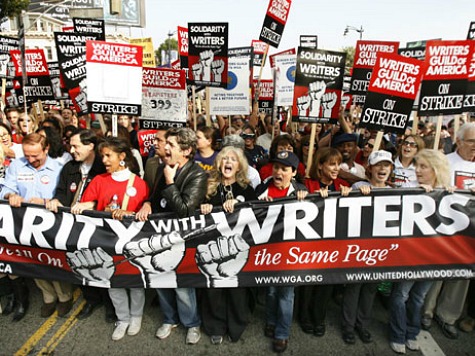For new writers in Hollywood, nothing has been more upsetting than surviving the past six years with a fractured industry. Now, with the writer’s spec market returning, things are finally looking up.
Ask any development studio executive in Hollywood, and they all give the same answer–“Because of the strike, the industry has never been the same.”
To fully understand, we throttle back to year 2007. At that time, writers could write scripts they love and sell them on what was called the “spec market” to prospective studios and companies. It was a marvel for starting new talent in the film industry, writing being the life blood of everything.
But then sadly came the Writer’s Guild of America union strike in late 2007. Something I remember very well. The so called “movement” claimed new media ventures would take over the industry (something that never happened) and that writers were not getting paid enough (cause making 200,000+ on writing jobs just wasn’t good enough). But the real concern for me came later.
The striking workers had their regular demands, but then became infused with the Obama-like fever. “The rich had to pay (studios),” “It doesn’t matter who we hurt, we deserve to get what’s ours,” they kept telling us. Well, that “hurt” turned out to be quite widespread.
The lowest point for me was seeing the striking workers put up Myspace profiles and pages to support their cause. Instead of putting up pictures of their own, the strikers put up pictures of Obama. It was then I got a terrible feeling in my stomach. “A political movement at the expense of everyone working in the industry, tell me that isn’t happening.”
It was much worse than I thought. The strike wiped out the spec market, costing new writers opportunities. Studios lost money, a lot of money, forcing them to look elsewhere to shoot their projects. States offered tax breaks, and studios saw their only avenue to afford the films they were producing. Hence why even today, you don’t see many productions shooting in Los Angeles anymore.
TV shows saw their episode orders cut in half. Some were just dropped entirely. Film projects were cancelled, leaving many producers to absorb big financial losses. It was a nightmare and an event unlike anything ever seen in Hollywood.
After a few months, the writers ended the strike. Many of the striking workers felt things would return to normal at that point, they didn’t, instead those working in the industry had to adapt to the “new normal.” Estimated losses from the strike run into the billions.
When the strike ended, and in the years since, I’ve seen the industry operate at a fourth of what it was, a rate of 25 percent of the industry I loved before the strike. People lost jobs, many who were working consistently on crew assignments suddenly couldn’t find work at all. The number of films produced decreased greatly in 2009-2010, with most forced to do so with much smaller production budgets. The only way to keep box office revenues increasing was to significantly raise movie ticket prices (something that’s still being done). Many film based businesses closed. It was then, I learned my first hard lesson in progressive politics, it’s always the little guys who lose.
Now, after so many long years, the spec market is returning to speed. The next generation of writers in Hollywood will now be given a voice. This new generation brings new-found hope in making the film industry thrive again.
Even as Sensei, I know it’s not over. I know the union has it in them to devastate the industry again with another strike based off politics. This is something the new writers will have to contend with, but with the spec market returning, the industry has taken a crucial first step in returning to form.

COMMENTS
Please let us know if you're having issues with commenting.